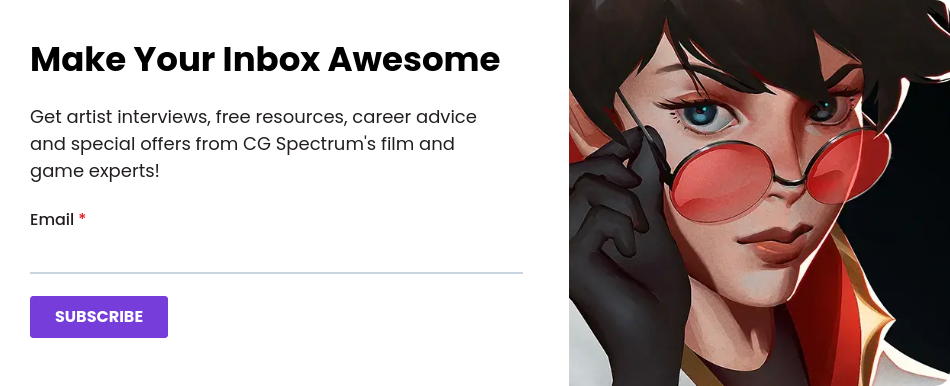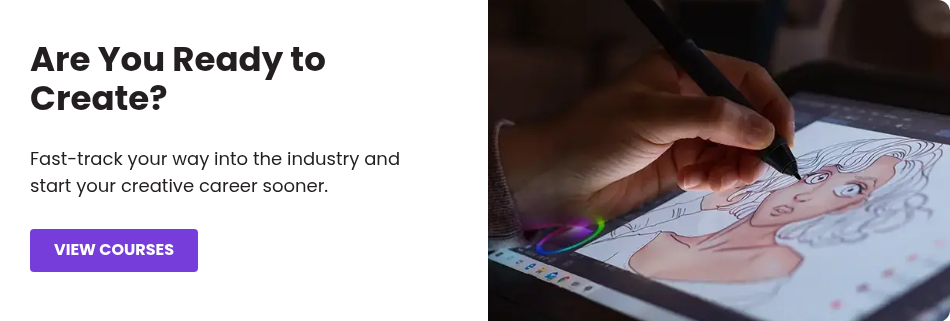What are the most in-demand VFX jobs right now and how do you get them? Magdalena Bisogni, who has worked in visual effects for 20+ years as both a VFX Producer and Recruiter at studios such as Method and Luma Pictures, has interviewed and hired hundreds of artists. She shares her thoughts on the most in-demand jobs in VFX and how to get them.
You’ll also get job tips from a few CG Spectrum VFX mentors who have spent years working on blockbuster films at top studios.
Benefits of starting a VFX career
One of the biggest benefits of starting a career in VFX is the potential for growth in the industry. With visual effects becoming more and more integral to film and television production, the demand for skilled VFX artists continues to increase.
A career in VFX also offers the opportunity to work on a diverse range of projects, from blockbuster films to exciting video game development. The field is constantly evolving and presents opportunities for creative problem-solving and technical innovation.
At CG Spectrum, our VFX courses provide comprehensive training for both beginners and experienced artists looking to further their skills and advance their careers. Our mentors are industry professionals who can offer insider knowledge and valuable industry connections.
Top 5 jobs in VFX right now
Read on to learn about each role and how to get a job in VFX.
The Tick VFX breakdown from CG Spectrum compositing mentor Jason Gottlieb's reel
1. Compositors
Number one on the list of most in-demand visual effects jobs is compositing. Compositors seamlessly integrate digital assets with live-action footage to bring together the final shots of a film or game.
Often when people think of VFX, they think ‘animator’ or ‘modeler’, but compositors are required for every single project–even when modelers and animators are not.
"Compositors play a varied role in VFX," Magdalena explains. "From seamlessly integrating huge VFX shots with CG characters, FX, and environments to working on invisible VFX which are barely noticeable. Invisible VFX could be adding steam, debris, rain, or smoke, painting out stray hairs or an unwelcome blemish on an actor, or removing the evidence of modernization from plate photography on a period film or tv show. They can stitch plates together for "seamless" long shots or when different takes are required to be used in the same shot."
"Crowd work is another area where they come into their own. If there isn't the budget or inclination to use crowd software you'll find compositors duplicating crowds for stadiums, train stations, public demonstrations, or mass events. And let's not forget sim travel, replacing backgrounds, windows, and reflections on a moving vehicle. There is so much that is not practical to shoot on location that compositing becomes a natural, versatile, and welcomed extension of the traditional live-action shoot."
To fully appreciate the magic of compositing, check out this breakdown reel from Iloura (now Method Studios Melbourne) for Game of Thrones: Battle of the Bastards. CG Spectrum compositing mentor Morgan Jones and his team won a VES award for ‘Outstanding Compositing in a Photoreal Episode’ for their work on this episode while at Iloura.
A compositor's ability to bring so much to the VFX table coupled with the fact they are required for every project makes them hugely in-demand.
In fact, a vast majority of CG Spectrum’s digital compositing course graduates get hired in the VFX industry.
Tips to get a job as a VFX compositor
Compositors work with various departments to ensure that all visual elements are delivered in compatible formats, so first and foremost, a solid understanding of the VFX pipeline, strong communication, and teamwork skills are critical.
In terms of technical skills:
“When hiring for compositing, I look for someone who has the overall eye and ability to make something look seamless,” says Magdalena.
I love looking at a shot on a reel before seeing the breakdown to try to ascertain what was worked on. Often it is obvious but sometimes I can't tell.
"Compositors should be able to match colors especially the blacks and whites to the live-action plate. A diverse range of shots helps. I like to see variety; chroma-keying, plate stitching, retiming and adding 2D effects, and a variety of CG integration. If the artist has a passion for photography, this work can be included at the end of the reel. It will show their ability to compose a shot and how they use and understand light which is all important in compositing. It is worth noting that a breakdown should ALWAYS be included, ideally annotated on screen, or else in a separate document.”
The job is both artistic and technical, and for the shots to look believable, a high attention to detail and proficiency using compositing tools to seamlessly integrate several layers in various different formats are crucial.
One of the most powerful and popular compositing tools used in the VFX industry is Nuke, and it’s the one students learn in CG Spectrum’s online Nuke courses. Other useful compositing tools include Adobe Photoshop, After Effects, and Maya.
Senior compositor and CG Spectrum mentor Brittany Piacente has worked on 50+ movies and TV shows at studios like Deluxe, Mr. X, and Method Studios. She offers this advice for aspiring compositors:
“Start by observing your surroundings, and then learn how to use the programs, and then dive deeper into the different composting techniques. Constantly be on the lookout for how people are doing shots. I suggest people interested in compositing really take the time to watch breakdown reels and read write-ups on how things are being done in the industry. The industry is constantly growing and developing new ways to do things."
Find a good mentor that will answer your questions and share their knowledge with you in a way that you can understand. It's one thing to learn how to do something, but it's another to have it explained in detail so you know why it's done that way.
Read more about the role and responsibilities of a compositor, or learn Nuke VFX compositing with a seasoned industry expert like Brittany or Morgan as your mentor.
2. FX artists
FX artists are a close second on the list of in-demand visual effects jobs. They create computer-generated images (CGI) to add to live-action footage during the post-production process. These effects could vary in scope from creating an entire alternate universe as in Avatar, to explosions and natural disasters, to more subtle effects like smoke and dust.
FX reel by recent CG Spectrum grad Mattia Rodini (now working at Bardel Entertainment)
"Visual effects are everywhere in movies, TV shows, games, and advertising, even if not immediately obvious," says Magdalena. "Many film studios rely on post-production to fix all kinds of problems. Things that aren’t safe, practical, or cost-effective to shoot in real life are created by FX artists. If a scene requires snow, but it’s the wrong season or shoot location, FX artists will add it in. Other examples of invisible FX incidentals include frosty breath, blood splatter, bullet hits, sparks, clouds, ocean extensions, and splashes. You may not think the movie you’re watching has many visual effects, but wait for the end credits and you’ll see how much FX work went into it."
Depending on the size of the studio and the kind of content they specialize in, an FX artist may do a bit of everything or specialize in a certain type of effect, such as water. In CG Spectrum’s online Houdini FX course students learn how to model, texture, simulate and render all kinds of VFX shots from scratch using Houdini and Redshift software ensuring they are versatile artists who can later choose to specialize in one area if they wish.
Movies often have a lot of invisible VFX work added which is not immediately obvious to the viewer. (Video: VFX breakdown of Parasite, Dexter Studios)
Tips to get a job as an FX artist
"As an FX artist you need to be really good at solving problems," says FX artist Daniel Hourigan, who is also the FX Department Head and mentor of the Houdini FX course. "There's no limit to the weird and wonderful effects you’ll be asked to do, It's important that you understand all of the facets of creating a convincing effect. It is not just about creating the effect, it's also about lighting rendering and compositing. Also, if you're trying to create realistic effects, always compare your effect to reference footage."
"Generally for FX artists I am looking for work that matches real-world physics unless, of course, the project calls for some sort of magical effect," says Magdalena. “FX Artists should closely study the effect they are creating in the real world and be able to replicate it. Composition, scale, form, speed, viscosity, depending on the effect these will come into play. As I've always worked at studios that don't necessarily specialize, I like variety, Rigid Body Destruction, fire, smoke, and other volumetrics, particles, and fluids all look good on a reel IF executed well."
Read more about the role, responsibilities, and salary of an FX artist for film or FX for games, or learn FX with industry mentors who have worked on blockbuster films and best-selling games.
3. Lighting artists
Lighting artists add atmosphere, depth, mood, and realism to CG shots. Just as lights are used on a physical set, lighting artists use computer-generated lights and adjust their color, placement, and intensity to make a scene (animated or live-action) come to life. They'll often use reference photos taken on set to match the lighting on CG assets. In animated feature films, the lighters are the finishers, they do the compositing and take the shot to completion.

"Lighting is a key role in any animation and visual effects production. It requires knowledge of color theory, photography, and a bit of science to make the scenes come to life. As such it is a highly technical AND artistic role," says Bryan Bentley, CG Spectrum mentor and award-winning artist who has worked in a variety of VFX roles at Lucasfilm.
Examples of shots before and after being lit by lighting artist Dan O Brien:
Before:
After:
Before:
After:
Tips to get a job as a lighting artist
"Lighting roles are hard to fill due to the knowledge needed to do them effectively," says Bryan. "Most people don’t understand the nature of these positions or that they even exist. What this means for prospective students is this: if one can cultivate skills in one of these areas the benefit is twofold; firstly, competition for these types of roles have less applicants. Secondly if one can stand out in these roles, landing a junior role is less competitive."
When hiring lighting artists, Magdalena looks for the following:
"Lighting artists should be able to show a variety of lighting setups and lighting under different conditions, interior and exterior, CG character and environments. Of course, matching to the live-action is imperative, so an understanding of light, composition, and real-world lighting techniques as well as a good grasp of compositing all help."
For anyone interested in becoming a lighting artist, check our virtual production courses which also cover lighting techniques in Unreal Engine.
4. Environment artists
Environment artists create digital indoor and outdoor settings when it is not possible or practical to film in real life (e.g. outer space, historical recreations, fantasy lands). Actors may be recorded against a green screen and their surroundings (buildings, roads, flora, furniture, etc) are replaced by computer-generated environments.
 CG environment by CG Spectrum 3D Modeling Foundations graduate Paul Griffin
CG environment by CG Spectrum 3D Modeling Foundations graduate Paul Griffin
In video games, these virtual environments have an additional layer of complexity. They must function and react according to the laws of physics and within the rules of the game universe. So characters must not be able to walk through walls, objects must react to gravity, etc (unless these are unique features of the game universe).
Tips to get a job as an environment artist
“Environment artists are coming into their own recently,” says Magdalena. “Often multi-skilled, an experienced and gifted environment artist may be able to concept, model, texture, light, matte paint and lay out the scene practically taking it through half of the pipe ready for compositing. Some can even composite their own work too. With the limitations on some locations and especially now as COVID impacts accessibility, environment artists are being utilized far more often. Their variety of skills means they can sometimes be utilized in other areas if required. Ideally, an environment artist can show different environments, from those matching a real location to more stylized and concept-driven sets.”
To get started on this career path, read about the role and responsibilities of an environment artist, or learn how to build 3D environments for films and games using industry-standard software like ZBrush, Maya, and Substance Painter.
5. Technical directors
Last on the list of in-demand VFX jobs are technical directors (or TDs). While there may not be as many roles available (for example, there may only be one TD for every handful of animators), Magdalena says that highly skilled TDs are hard to find and therefore in demand.
She says TDs are the glue that holds everything together: “Technical directors are usually the first people working on a project as they ascertain the needs and build the tools to deliver, and they are often the last ones working on a show as they help troubleshoot the final shots. You can find technical directors in every department and also working in teams on the core pipeline. They help the creative to be realized with as little technical interference as possible. They make it easier for the creative to create.”
“The term ‘technical director’ is sort of a catch-all title for people who are responsible for so many parts of CG production,” says CG Spectrum mentor Ben Fox, who was the Lead FX Technical Director at Framestore in New York. “You can be a junior technical director or lead technical director. There are lighting TDs, FX TDs, and rigging TDs. People who are primarily responsible for creating FX elements in a program like Houdini for example would be FX TDs.”
Without FX TDs, nothing would've happened when Thanos snapped his fingers. Dragons could still do a lot of damage, but there'd be no burning buildings or massive crumbling walls. Basically everything would be a lot less exciting.
“The ideal FX TDs are patient and creative problem solvers who revel in refining simulated or generated elements to support the main action of a shot,” says Ben.
Tips to get a job as a technical director
“TDs often start out as animators or FX artists but find themselves more drawn to the technical side of their craft rather than the creative,” explains Magdalena. “Those who started out as artists or animators have a solid grasp of the creative process, so they make better TDs because they understand the artist’s role and needs.”
“It may sound obvious but technical directors need to have a good grasp of the more technically driven aspects of VFX. Understanding computer science and not just how the software works but why it works or at times doesn't. They have a gift for coding and a knack for engineering.”
To become a TD, it helps to study animation or take an FX course to get confident with the fundamentals first and then start creating pieces for your demo reel.
That's just five of the more in-demand jobs in the VFX industry, but as Bryan Bentley says: "There are a myriad of disciplines that go into any production involving animation and visual FX, and the list is ever-growing as technology gets more advanced."
"We have come so far in VFX in a relatively short time and it's made it easier for studios and directors to create movies that are entirely VFX," adds Magdalena, pointing to Lion King as a recent example. "Machine learning also presents opportunities to take care of some of the repetitive, rudimentary tasks, freeing up artists up to do cooler stuff. But these kinds of advancements will never replace human creativity."
Access expert career advice and support
In addition to honing your craft and gaining industry-relevant skills, studying at CG Spectrum also offers career services including demo reel reviews, job placement assistance, resume and cover letter support, and networking opportunities with industry professionals—crucial parts of landing a job in the VFX industry.
With expert guidance, you can ensure that your demo reel, portfolio resume, and cover letters stand out to potential employers and increases your chances of getting hired.
Unsure if CG Spectrum is right for you? Ask some of our students! Chat with VFX students about the course curriculum, how mentorship works, what the culture and community are like, details about the career services, and more. Start a chat with one of our student ambassadors and they'll give you an honest review based on their experience.
Kick-start your VFX career with CG Spectrum!
Now that you know which VFX jobs are out there, get studio-ready at a VFX school that offers personalized career training and mentorship from VFX artists who have worked on major films and games.

Related Links




